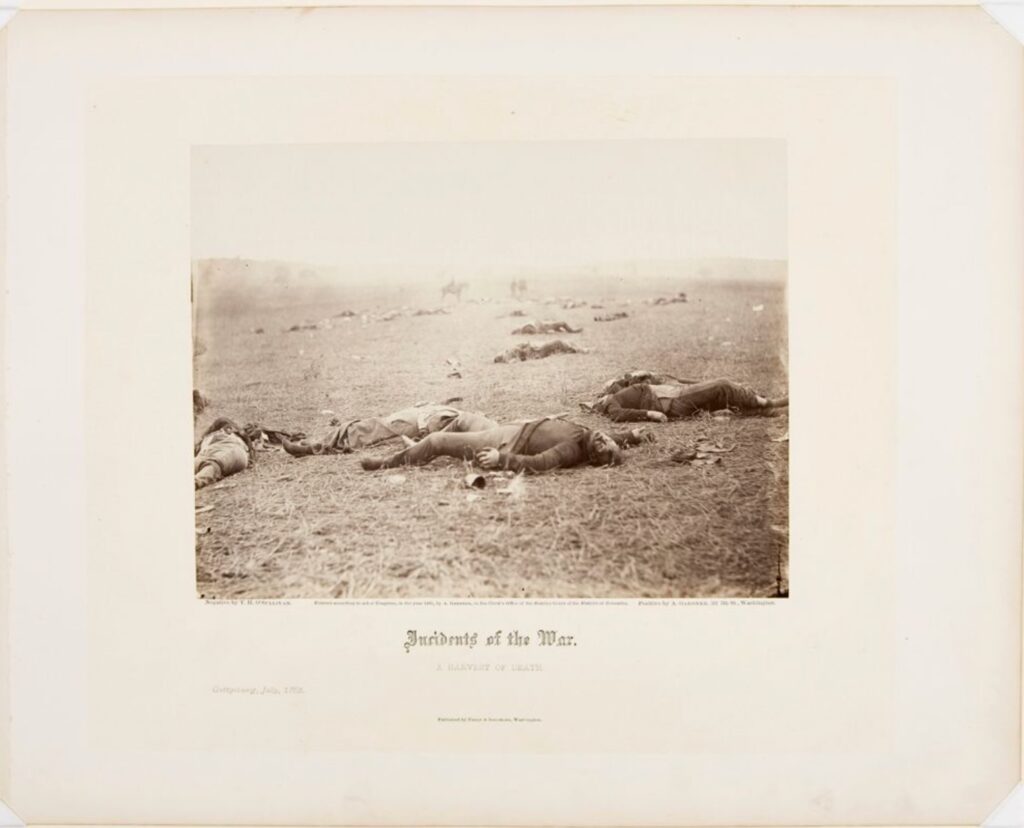Today is Memorial Day. It’s altogether right and fitting to remember that we’re here today because hundreds of thousands of Americans, ordinary people called to extraordinary things, willingly gave up their lives. It’s one of the deepest human ways of seeing ourselves in light of what Edmund Burke called our “unbought grace of life.”
Probably 25,000 dead on the American side in the Revolutionary War; around 620,000 (both sides) during the Civil War, i.e., the struggle to preserve the union and put an end to slavery. More recently, 58,000 in Vietnam. Another 7000+ in Afghanistan and Iraq. And more, sadly, to come.
For all the controversies surrounding every one of these conflicts, we – who despite our troubles, by historical standards, live lives of rare tranquility and ease – need to remember them with no little gratitude.
That is how civics teachers in schools once would have presented this holiday. I wonder what they do these days, when our public institutions show every sign of being mentally, morally, and spiritually disturbed?
I’m not a Civil War buff. But friends who are have taken me through sites in Virginia, which are historically fascinating and deeply moving. According to one source, deaths in the war between the states were “approximately equal to the total of American fatalities in the Revolutionary War, the War of 1812, the Mexican War, the Spanish American War, World War I, World War II, and the Korean War, combined.” For us in 2023, it’s especially urgent to remember these body counts when a nation forgets sacrifice for the common good and tears itself apart, as ours seems to be doing again.
When I write about the loss of historical memory, readers sometimes tell me they don’t know what I’m talking about. But it’s taking place – with serious consequences – in all sorts of ways, large and small. Many Americans now have no idea when the Revolution, Civil War, etc. occurred. And even deeper realities are being overshadowed, ironically by those who consider themselves “woke.”
We’ve all been reading these days, for instance, about the absurd spectacle of the Los Angeles Dodgers choosing to honor, then under pressure disinviting, then under other pressures re-inviting the “Sisters of Perpetual Indulgence” for “Pride Night.” The Sisters are drag queens who regularly stage obscene, blasphemous public performances involving fetishes and Jesus, pole-dancing on the Cross, and much worse. (I won’t put links to videos here, but it’s easy – if you want to see for yourself – to find them online. Prepare to be shocked)
The Dodgers plan to honor the Sisters with a Community Hero Award on “Pride Night” (June 16) for their charitable works, which mostly means promoting LGBT+s and raising money for AIDS treatment – all very “inclusive,” of course.
Meanwhile, as even The Los Angeles Times noted, one-third of angelenos are Catholic, many “quite devout,” and there are even several of such strange beings within the Dodgers “organization.” Perhaps that’s why the Dodgers now have scheduled, belatedly, a “Christian Faith and Family Day.”

But where, amid what are crude arguments over self-indulgent and self-destructive sex, is awareness that real Catholic Sisters have for centuries taught, nursed, ministered to, and defended tens of millions of people, Catholics and not? And not only in Los Angeles or California, but around the world. Their contributions to humanity are so massive and truly inclusive that all the Pride Nights and Perpetual Self-Indulgencers in the world are, by comparison, offensive trivialities.
Where, in all this, is even the memory of the historical fact that Los Angeles was founded by Catholics? Its original name refers to “Our Lady Queen of the Angels,” El Pueblo de Nuestra Señora Reina de los Angeles. If you want to debate evils that ensued, fine. No human group has ever been sinless. But let’s be accurate and tell the whole truth. Some Catholics, like St. Junipero Serra, tried to prevent evils and promote good. So while we’re discussing past sins, let’s also remember the many indisputable good things that also followed that founding.
Does anyone among our trans-crazed, LGBT-fixated ruling class remember any of that anymore?
Does anyone among our race-obsessed, reparations-mad public opinion leaders recognize that hundreds of thousands of people, white and brown, died to end slavery?
Or is the truth – the full truth about our very own past – simply to be sacrificed on the altars of political (now, sexual or racial) partisanship?
Millions try to enter America every year, despite allegedly horrifying “white privilege” and “Christian hate.”
Despite this and other evidence that much is still good here, we’ve become like neurotics who can only obsess about past faults and find it hard even to remember their lives as anything but a string of embarrassments.
Which is why remembering – remembering fully, truthfully – is crucial not only in justice and gratitude for the past, but for our present and future sanity.
Memory makes us human. God Himself doesn’t remember. He knows and holds everything eternally in his sight. Yet he’s given us memory, for a reason. If you’re reading these words, learn the truth about past and present. Remember it. Defend it.
I teach American and foreign students every summer in Europe, and introduce them to the poem that Robert Frost read at John F. Kennedy’s inauguration about the gift of yourself to something larger than yourself – however imperfect you and it and the gift itself may be. Which ends:
The Gift Outright
The land was ours before we were the land’s.
Something we were withholding made us weak
Until we found out that it was ourselves
We were withholding from our land of living,
And forthwith found salvation in surrender.
Such as we were we gave ourselves outright
(The deed of gift was many deeds of war)
To the land vaguely realizing westward,
But still unstoried, artless, unenhanced,
Such as she was, such as she would become.
Realistic, patriotic, and implicitly Christian words.
A Blessed Memorial Day.
__________















